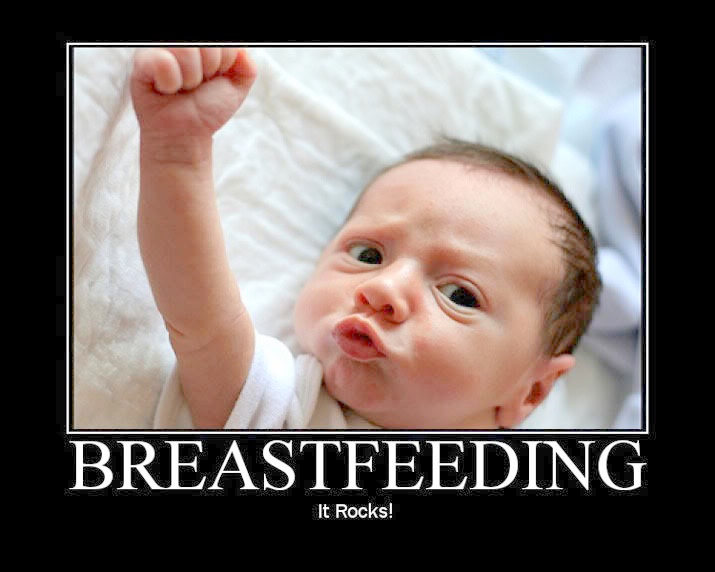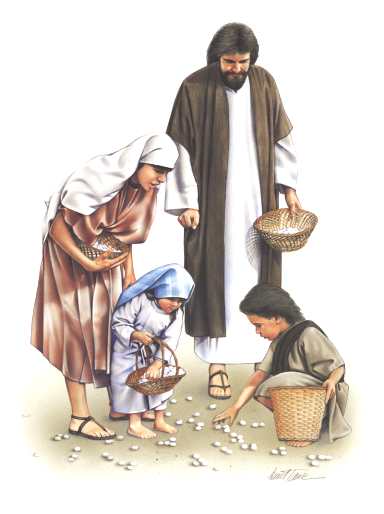Parenting can be stressful. Like that moment when your pediatrician tells you that your baby has only put on one ounce in the last two weeks. Suddenly you realize that you are probably the worse parent the world has ever seen, and that you are failing this helpless little creature who looks to you for everything. Nevermind that she is a healthy, active baby who can push herself up into a standing position in your hands, make eye contact, babble, mimic faces, laugh, and blow the sides out of a diaper with the best of them. Never mind that she grew an inch in length and a centimeter in head circumference. One ounce of weight gain, and immediately you begin to doubt your competency even to be a parent.
Then you start wondering, “How do I tell my parents? How do
I tell my in-laws? Won’t they just pounce on us with more advice than we can
shake a stick at? Will we have to rehash every parenting decision since
conception and justify them all?”
But most of all, the all-consuming question is, “How do we
get the breastmilk to come in more plentifully?”
Of course the answer is simple, and not too far off from
what we were already doing. The plan is mostly a scheduling thing, basically
just make her eat every 2 ½ - 3 hours, whether she wants to or not. This means
stop letting her sleep through the night (sad face) and wake her up for a
feeding every 3 hours minimum until she bulks up and has the fat reserves to go
longer.
What that simple plan adds up to in real life, though, is a
lot of anxiety, and almost no sleep for the first couple of days. Since my wife
is pumping after every feeding, we usually have an extra half an ounce or so of
milk in a bottle at the end of the feeding, and the temptation is to save those
little scraps up, add them together, and give Evie a monster feeding at the end
of the day, and give Mommy a rest.
But “No” says the lactation consultant, “That’s not what you
want to do.” Instead she wants us to use it as we go. Just feed it to her from
the bottle, because it takes less work than the breast and she will swallow it
even when she is tired. So now, unlike a few days ago when I could look in the
fridge and see at least a couple of ounces chilling there that we could fall
back on in an emergency, now there is nothing. There is only one feeding at a
time.
There are moments when I see the appeal of formula, not as a
supplement or as a replacement in emergencies, but as a full time strategy.
Formula is 100% in my control. I can go out and buy it when we need it, I can
stockpile it, I can mix as much as I want, and we can always see it, there on
the counter, ready to go. There is no fear
that maybe this time, there just won’t be enough. This despite all my medical
training and having done multiple research papers on the benefits of breastmilk
over formula, still, it is attractive because it is 100% in my control. I can
forcefeed that baby and make her put
on the rolls!
It shouldn’t be too hard to see where I am going with this,
should it?
Well, lo and behold, yesterday morning after less sleep than
I could conveniently count I turned on the Divine Office podcast while we fed
Evie her morning meal, which we refer to as first breakfast. The whole series
of psalms and readings was so perfect I am linking you to the page here (go to
Office of Readings tab).
Yet still they sinned
against him;
They defied the Most
High in the desert.
In their heart they
put God to the test
By demanding the food
they craved.
They even spoke
against God.
They said: Is it
possible for God
To prepare a table in
the desert?
It was He who struck
the rock,
Water flowed and
swept down in torrents.
But can He also give
us bread?
Can He provide meat
for his people?”
When He heard this
the Lord was angry.
A fire was kindled
against Jacob,
His anger rose
against Israel
For having no faith
in God;
For refusing to trust
in his help.
Yet he commanded the
clouds above
And opened the gates
of heaven.
He rained down manna
for their food,
And gave them bread
from heaven.
Mere men ate the
bread of angels.
He sent them
abundance of food;
He made the east wind
blow from heaven
And roused the south
wind by his might.
He rained food on
them like dust,
Winged fowl like the
sands of the sea.
He let it fall in the
midst of their camp
And all around their
tents.
So they ate and had
their fill;
And He gave them all
they craved.
Psalm 78:17-29
When I read this, two feelings immediately struck me. The
first was renewed hope and gratitude. Trust. God is trustworthy. He designed
the whole breastfeeding system, He loves Evie far more than we do, and we can
safely trust her with Him.
The second was shame. I had not been trusting. I had been
freaking out, at least deep down inside, if not actually in words or actions. I
mean really, what is your trust worth if you only trust Him when everything is
going right?
Of course, as I type this a little voice in my head
whispers, “Oh, it’s all very well to trust God in most things, but this is
different. This is serious. Too much is riding on this to sit back and do
nothing.”
But what about the Israelites in the desert? What did God
tell them?
“And when the dew had gone up, there was on the face of the
wilderness a fine, flake-like thing,
fine as frost on the ground. When the
people of Israel saw it, they said to one another, “What is it?” For they did
not know what it was. And Moses said to them, “It is the bread that the Lord
has given you to eat. This is what the Lord has commanded: ‘Gather of it, each
one of you, as much as he can eat. You shall each take an omer, according to
the number of the persons that each of you has in his tent.’” And the people of
Israel did so. They gathered, some more, some less. But when they measured it
with an omer, whoever gathered much had nothing left over, and whoever gathered
little had no lack. Each of them gathered as much as he could eat. And Moses
said to them, “Let no one leave any of it over till the morning.” But they did
not listen to Moses. Some left part of it till the morning, and it bred worms
and stank.”
I am pretty sure the Israelites were far more desperate than
we are. They had no reserves, their very lives were at stake. If the manna
failed to come, they were literally going to starve to death! Is it any wonder
some tried to hoard up a supply? And yet God was requiring trust of them. He
was requiring them to trust Him with their lives, to give up their attempts at
control and just enjoy His providence.
This is what He is requiring of us. Absolute trust. That
little voice is right. It is all well and good to trust God most of the time,
but until I trust Him with something that really matters, when my life or the
life of someone I love is at stake, I have not really trusted Him.
So I thank Him for this trial of trust, and I am sorry for
not having seized it more fully. But all things work together for good to them
that love Him, even my slowness of heart. Glory be to Him!
















